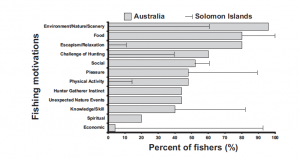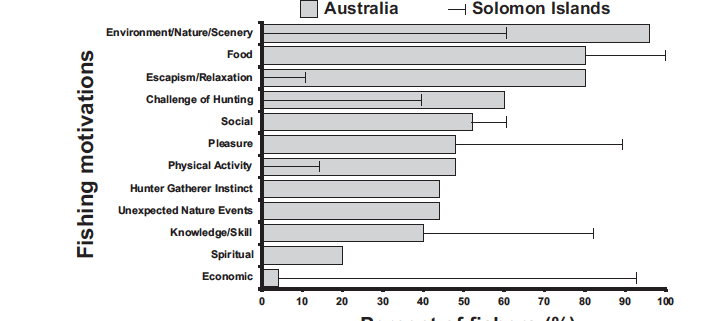Why do Fishers Fish?
By Emily Rose Nelson, SRC Graduate Student
Humans have been fishing for over 40,000 years. Initially, the world’s waters were thought of as a resource with no bounds. However, intensification of fishing pressure over the last 100 years has decimated fish populations, forcing us to realize that the oceans’ resources indeed do have limits. Today, fish make up more than 16 percent of the global human protein intake, whether it is in the form of subsistence fishing in developing countries or extravagant restaurants in wealthy countries. As demand for marine resources continues to grow, pressure on fish populations is also increasing. Governments around the world have started making efforts to slow the decline of ocean resources, but in many cases the success of these initiatives is dependent on compliance of the fishermen. Essentially, conservation efforts are in direct conflict with fisher objectives. For this reason, it is important to understand why a fisher is fishing in the first place – knowledge of fishers’ motivations will help policy makers identify the most effective conservation methods.
Young et al. 2016 set out to answer the question, “Why do fishers fish?” using an ethnographic approach. They conducted semi-structured interviews of experienced male fishermen at two sites, Australia and the Solomon Islands. The interviews gathered information about their general background, fishing methods, motivations for fishing, and feelings upon return from a fishing trip.
The interviews identified an overwhelming split in motivation to fish between the two study sites. 100 percent of fishers in the Solomon Islands were motivated by food and 93 percent were motivated by income. In contrast, 96 percent of the fishers in Australia were motivated by a connection to the environment. Recognizing these differences in incentives can help managers to form the best conservation policy for each region. For example, one could not realistically set in place a no-take marine reserve throughout the Solomon Islands without providing the fishermen and their families with an alternate source of food and income.

Motivations for fishing in Australia (gray bars) and the Solomon Islands (black lines).
Despite the drastic difference in ‘primary reason to fish’ between the Solomon Islands and Australia, interviews revealed that many other drivers were the same. When fishers in the Solomon’s were given a hypothetical situation in which they had secured an alternate income, 100 percent of interviewees indicated that they would still continue to fish whenever possible. This shows that the fishers are getting enjoyment out of their work and indicates the presence of a somewhat recreational mindset. Therefore, if economic conditions were to improve in the area there would likely be a growth in recreational fishing. In Australia, where recreation is the primary reason for fishing, 80 percent of fishers identified food as a secondary incentive. For those people, fishing provides an escape from their stressful day to day lives, with the added bonus of catching a fresh meal for a price much cheaper than what is available at local fish markets.
Young et al. were not only able to identify clear-cut cultural differences in fishing motivations, but also recognize that fishing may provide benefits to individuals and communities that transcend these traditional motivations. In both the Solomon Islands and Australia, mentions of social bonds with fellow fishers and camaraderie were widespread in interviews. Lastly, the interviews revealed that fishing might not be as far off from conservation as some may think. The values identified of many fishers in this study, such as “teach children to appreciate nature” and “foster respect for the environment” are very similar to those of conservationists. As said by an Australian fisher, “fishing provides environmental benefits because we like to protect things that are dear to us.”
References
Young, A.L., Foale, S., & Bellwood, D.R. (2016) Why do fishers fish? A cross-cultural examination of the motivations for fishing. Marine Policy, 66: 114-123.




Leave a Reply
Want to join the discussion?Feel free to contribute!